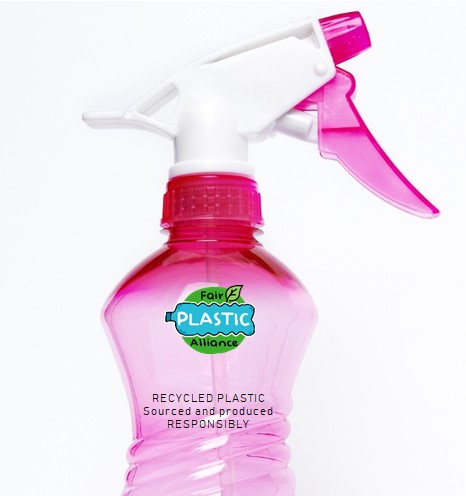The FPA label stands for responsible sourcing and production in the plastic recycling sector, backed up by accountable reporting and measurable impact.

Products
Whether you are a business or a private citizen, by purchasing these products you are
shaking up the way plastic is recycled
Reducing your
plastic footprint
Supporting the livelihoods of
thousands of waste workers
Look for the Fair Plastic Alliance seal and join the shake
#shaketheplasticquo
Areas of impact
All partners and projects operate according to the FPA Standard, which ensures that minimum requirements are met in all areas of impact
 On the environment
On the environment
The Fair Plastic Alliance believes in the transition to a circular economy model and is striving to shape a new role for waste in the plastic production chain, designing it to be out of the system and no longer a menace for the planet and for public health. All FPA projects fall within the recycling sector and promote responsible and forward-thinking waste management in low-income areas of the world. All stakeholders involved commit to environmental protection and their environmental impact is measured as the amount of CO2 saved by producing recycled plastic.
 On people
On people
Waste workers are at the heart of the Alliance and we are working to ensure they have access to fair market wages and decent livelihoods, while striving to improve them further. All Fair Plastic initiatives receive guidance and monitoring to ensure human and labour rights are respected throughout our production and supply chain. Suppliers and third parties are also evaluated against universal human rights, creating a global culture of compliance and social awareness.
 On entire communities
On entire communities
The Fair Plastic Alliance intertwines business and respect for human rights and dignity, fostering a culture of inclusion and progressive social advancement. We appreciate the value that communities bring to the activities of the Alliance and as such we wish to give back to the communities through the value we generate, as profits are reinvested to broaden the impact of recycling initiatives worldwide. In believing local communities to be the best business partners in the recycling sector, we strive to ensure their participation as partners and, eventually, co-owners in the recycling activities.
 On the economy
On the economy
The FPA aims at improving the economic conditions of low-income communities, by creating jobs and vocational training opportunities. All initiatives provide for sustainable, inclusive and responsible financing and are accompanied by the creation of socially aware infrastructures in the local communities involved. Furthermore, the FPA commits to accountability reporting of measurable economic, social and environmental impact. Members are all called to feed performance data of all waste collection and recycling processes on a centralized and neutral platform.
